Brian Johnson interview
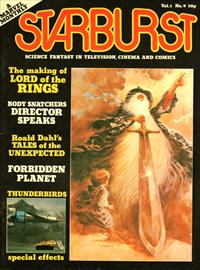
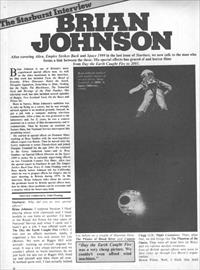
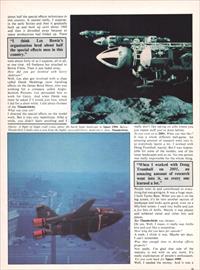
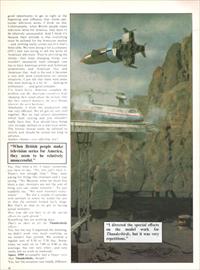
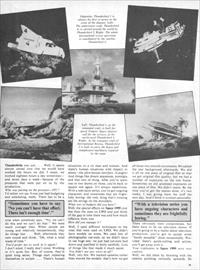
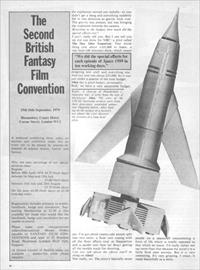
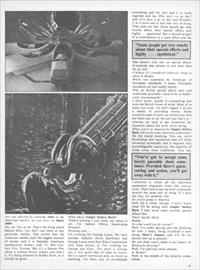
Starburst 9 (May 1979); interview by John Fleming p13-16
After covering Alien, Empire Strikes Back and Space: 1999 in the last issue of Starburst, we now talk to forms a link between the three. His special effects has graced sf and horror films from Day the Earth Caught Fire to 2001
Brian Johnson is one of Britain's most experienced special effects men. As well as the titles mentioned in this interview, his film work has included Taste the Blood of Dracula, When Dinosaurs Baled the Earth, Mosquito Squadron, Something to Hide, Nothing but the Night, The Blockhouse, The Tamarind Seed and Revenge of the Pink Panther. His television work has also included several episodes of Budgie, New Scotland Yard, On the Buses and Please Sir.
Born in Surrey, Brian Johnson's ambition was to take up flying as a career, but he was wrongly advised against it on medical grounds. Instead, he got a job with a company making television commercials. After a time, he was promoted to the laboratory and. for years, he was a camera assistant on a variety of film documentaries and tv commercials. Then he became an assistant on feature films, but National Service interrupted this promising career.
He started in special effects on Hammer films, working at Bray Studios with the near-legendary effects expert Les Bowie. Then he moved onto the Gerry Anderson tv series Thunderbirds and joined Douglas Trumbull for the epic 2001. He returned to the Gerry Anderson team - and to Bray Studios- as Special Effects Director on the Space: 1999 tv series. He is currently supervising effects on two Twentieth Century Fox films: Alien (see the special report in Starburst 8) and The Empire Strikes Back- Star Wars II. John Fleming went to Bray shortly before Johnson left for California, where he was to prepare effects for Empire, due to start shooting in Britain during 1979. In the interview. Brian Johnson talks about his career, the problems faced by British special effects men. how he thinks those problems can be overcome and a surprise which the future may hold.
Interview conducted by John Fleming
Starburst: Why did you go into special effects?
Brian Johnson: I suppose because [ liked playing about with chemicals and I liked models in one form or another. I'd been in the Royal Air Force for two years of National Service and when I came out I hadn't got a job. I was offered work on The Day the Earth Caught Fire (1961). I was just an effects assistant, really. I organised a few bits and pieces for Les (Bowie). We were at Biggin Hill with aircraft: running up aircraft engines for wind. It was a very cheap picture and we couldn't afford to build machines. So we just built the sets out at Biggin Hill, lined up real aircraft and blew them all over. It worked quite well. I had actually helped Les before on a couple of Hammer films: The Pirates of Blood River and Captain Clegg (US: Night Creatures). Then, after that, we did things like The Phantom of the Opera. They were all done here (at Bray) and on various sandpit locations.
Lots of British special effects men seem to have come up through Les Bowie's organisation.
Bowie Films. Well, I think that bred about half the special effects technicians in this country. It started really, I suppose, in the early Sixties and then it gradually built up and built up until about 1969 and then it dwindled away because so many productions had folded up. There were about forty of us I suppose, all in all, at one time. All freelance but attached to Bowie Films. Then it just faded away.
How did you get involved with Gerry Anderson ?
Well, Les also got involved with a chap called Derek Meddings (now handling effects on the James Bond films), who was working for a company called Anglo-Scottish Pictures. Les persuaded him to work for Gerry. And when Derek was there he asked if F would join him, which I did for a short while. I did about thirteen of the Thunderbirds.
What was your job ?
I directed the special effects on the model work. But it was very repetitious. After a while, you didn't learn anything and I really don't like taking on jobs where you just repeat stuff you've done before.
So you went on to 2001. What was that like?
It was a whole different ball-game. An amazing amount of research went into it, so everybody learnt a lot. I worked with Doug Trumbull, mainly. But I was responsible for some of the models, one of the lunar landscapes and so on. No one person was really responsible for the whole thing.
People went in and contributed to everything that was going on. It was a huge team. I built Tycho Base. When you see it on the big screen, it's let into another section of landscape and looks quite good, even on a fifty-foot screen. I used tiny bulbs and just a few bits of Airfix. Mainly it was plaster and soldered metal and other bits and pieces.
But Thunderbirds was cheaper ...
Oh yes. Well, I mean, it really was Airfix kits and just like a sweatshop.
How long did you have per episode?
A week, I think it was. Maybe ten days. I can't remember.
Was that enough time to develop effects properly?
Not really. I'm glad that side of the industry is not with us any more. It's really exploitation of people's enthusiasm.
Yet you went back for Space: 1999.
Well, I needed the money. And it was a good opportunity to get in right at the beginning and influence that whole particular television series. I think we did. Unfortunately, when British people make television series for America, they seem to be relatively unsuccessful. And I think it's because their attitude is that everything must be tailored for the American market - and nothing really comes out of it that's believable. We were doing it for a company (ITC) that was trying to sell the series to American television. They're providing the money- they keep changing things you wouldn't necessarily want changed- one has to have American artists and American scriptwriters and American this and American that. And in the end it becomes a very dull, drab compromise on various situations. I just felt that there were areas that were lacking in a bit of ... lacking in enthusiasm ... and good concepts.
I've heard Gerry Anderson complain the problem was the American executives kept changing their minds about the format. One day they wanted monsters, the next human interest, the next hardware.
Absolutely. I think the production side was very efficient. We all got on very well together. But we had certain parameters which kept varying and you shouldn't really have that. You should have things very strongly defined on a television series. The format should really be adhered to strictly and should be sorted out long in advance.
Sudden changes were affecting you?
Yes, they were a bit. I mean, sometimes you have to say. "No. you can't have it. There's not enough time." They were asking for things like monsters and I was saying. "No. Because, when we shoot live shots a day. monsters arc not the sort of thing you can create instantly." To just suddenly say. "We want monsters everywhere" ... We did a couple of episodes with animals in where we scaled the sets so that the animals looked fairly large. But that's as near as we got to having actual monsters.
How long did you have to do the special effects for each episode ?
Something like ten working days.
That's as short as for the Thunderbirds effects.
Yes, but the way I organised the shooting, we didn't work very much overtime, so we weren't that pushed. We worked a regular sort of 8.30 to 5.30 day. Sometimes we went on to 7.00 or 8.00 in the evenings, but not very often; and very rarely did we work at weekends.
Space: 1999 presumably had a bigger crew than Thunderbirds, though?
Yes, but the situation was totally different. Thunderbirds was just ... Well, it seems almost unreal now that we would have worked the hours we did. I mean, we worked eighteen hours a day sometimes and seven days a week - because of the pressures that were put on us by the production.
Who was putting on the pressure - ITC?
I'd rather not say. It was just bad budgeting and scheduling, really. There has to be a time when somebody says, "No, we can't do this and we can't do that." We were much younger then. When people are young and relatively inexperienced, they do things that ... Well, afterwards they turn round and think, "Oh, what a total waste of time."
You'd prefer not to work in TV again ?
I don't mind. I really don't mind. Working in TV's quite fun. But, of course, they're quite long series. Things start repeating themselves in scripts ... There's human situations vis a vis man and woman. And there's human situations with respect to aliens - the alien-human interface. (Laughs) And things like dream sequences, nostalgia and that sort of thing. After you've spent one or two shows on those, you're back to square one again. It's always repetitious. With a television series, you've got ongoing characters and sometimes they are frightfully boring; the only thing that's missing are the strings on the shoulders.
What sort of budgets did you have?
Well, the special effects on Space: 1999 cost less than the ones on UFO and just think of the gap in time there was and how much inflation there was.
How did you manage it?
Well, I used different techniques to the ones that were used on UFO. We didn't have models on wires. We used lots of photographic cut-outs, so we didn't have to use huge sets: we just had cut-outs laid down and matched in fairly carefully. Lots of things like that made it much easier.
You didn't use any wires at all?
Well, very few. We tracked cameras rather than moved the models: that's how we got all those very smooth movements. We added the star background afterwards. We did it all on one piece of original film so that we got original film quality, but we had a number of exposures on the one frame. Sometimes we did seventeen exposures on one piece of film. We didn't matte. By the time you've got the mattes done, it's two weeks. I was giving them the stuff the next day. And I think it worked admirably.
There obviously were compromises, but there have to be on television shows. If you're going to be a realist about television production, you've got to accept some "barely passable" shots occasionally. Provided there's quick-cutting and action, you'll get away with it.
Your explosions in Space: 1999 were very realistic.
Well, we did them by shooting with the camera pointing vertically upwards. So yes. I've got about twenty-odd people split into two units: a floor unit coping with all the floor effects over at Shepperton [Pinewood] and a model unit here (at Bray) getting all the models ready for shooting.
Can you talk about the effects you'll he doing on Alien?
Not really, no. The story's basically seven people on a spacecraft encountering a form of life which is totally opposed to that which we know. I'd really rather not say more than that because the script's in a fairly fluid state anyway. But it is very interesting. It's very gripping. I mean, it reads beautifully as a story.
Are you affected by tailoring Alien to the American market, as you were on Space: 19997
No, no. Not at all. That's the thing about feature films: you don't aim them at any particular market. One knows that the American market pays the biggest amount of money and it is basically American (production) money - well, it's 20th Century Fox, Europe. But it's a feature film about a science fiction subject and that's it. It's being directed by Ridley Scott, so it should be good.
What about Empire Strikes Back?
There's nothing I can really say about it yet. I'm Special Effects Supervising Director.
Working with ...
I'm working for George Lucas. We have another director (Irvin Kershner) but George Lucas owns Star Wars Corporation with Gary Kurtz, so I'm working for George and Gary. The point is George has a very good idea of what he wants. He's a superb technician and, as much as anything. I'm there just to co-ordinate everything and for him and I to work together and say 'Why don't we do this?' and 'Let's have a go at that' and 'Wouldn't it he a good idea' and that sort of thing. That suits me fine. Some people get very touchy about their special effects and highly ... egotistical. But it should be part of a contribution to a team effort and the film doesn't only rest on special effects. Everybody else pitches in and does their bit as well.
I believe it's considered relatively cheap to shoot in Britain.
We're not expensive by American or European standards. I mean, European standards are just totally unreal.
Why do British special effects men - and technicians generally - seem to he so highly rated internationally ?
I don't know, maybe it's something that suits the British frame of mind. Most of us enjoy our work : we don't regard it as just a means of providing money. Some countries seem to turn out technicians who are there just to do the job and that's it whereas we tend to get somewhat enthusiastic about the work we're doing. When you're in America for Empire Strikes Back will you he using American technicians ?
On the model shooting. You see, we're developing new equipment and it's fairly advanced technically and it requires very knowledgeable operatives: the majority of those come from California. You see, California is where all the electronic equipment originates from - the innovations. That's not to say we won't eventually acquire the same sort of thing. If I have my way, we certainly will.
So you're going to America.
Only for a while, though. I don't know what I'll be doing after Empire Strikes Back. I may never make another special effects film.
That's hardly likely.
Really.
So what would you do instead?
Well, I'm really getting into the directing bit now. I mean, Doug Trumbull is now doing Hiero's Journey and it'll be his second film as a director.
Do you think you're liable to get finance in Britain for directing ?
Well, I'm half-way there already.
In Britain?
Well, in the middle of the Atlantic somewhere.
Space: 1999 copyright ITV Studios Global Entertainment